- Home
- Michael Northrop
Polaris Page 16
Polaris Read online
Page 16
Aaron blinked back at him, and then responded, “Are you joking?”
“I most certainly am not!” Owen boomed. “You will turn this ship or I will!”
He took two long forceful strides back toward the wheel. Aaron’s eyes grew wide, and he began turning hard. Owen slowed and then stopped as a hand slapped down on his right shoulder. It was Thacher’s.
Uh-oh, thought Emma.
Owen spun around, his left hand reaching round to peel Thacher’s hand free and his right hand reaching for his belt.
Emma gasped as Owen gripped his pistol.
Thacher released his shoulder and backed away.
All eyes were on Owen’s right hand. It was only when he followed their gazes that he realized what he’d done—or at least that’s the way it seemed to Emma. Whatever the case, he quickly dropped his hand from his gun.
The shipped bucked on the waves as it began its abrupt turn to the left, and the assembled crew members sank low to keep their balance. Emma reached over to help her sister, stealing a quick look at her bandaged foot. It looked like a packet that had fallen off the butcher’s wagon and into the street. Maria’s balance was solid, even on one good leg, and her shoulder felt warm and reassuring under Emma’s palm. Maria acknowledged the help with a quick nod. Henry, of course, fell down, banging one knee on the deck. “Ow!” he said.
“Careful there,” said Owen. The little distraction seemed to lower the tension slightly. Emma’s eyes darted upward instinctively to see how the wind was hitting the sails as their direction shifted.
“We’ll need to adjust the sheets and stays,” she said.
The others shot their own quick looks up at the flapping canvas. “We will,” said Thacher, “if we are to go through with this ludicrous change of course.”
Emma didn’t know what “ludicrous” meant, but from the way Owen visibly bristled at the sound of it, she knew it wasn’t good.
“What do you mean ‘if’?” said Owen.
“I mean that this affects all of us,” said Thacher, narrowing his eyes like a cat on the hunt. “And as such, we all deserve a say. I demand a meeting, a vote.” He waved his hand around in an abrupt circle, nearly slapping Henry’s face. “We all do!”
“Huh?” said Henry.
Emma was equally surprised to find herself included, but her sister wasn’t. “It’s only fair,” said Maria, before elbowing Emma not especially lightly in the side.
“Oof,” said Emma. She wasn’t sure she agreed, but she didn’t want another of her sister’s sharp elbows. “A meeting couldn’t hurt,” she said, instantly regretting her choice of words. Hadn’t this all begun with a meeting on deck one stormy night?
She said the words without conviction, but they hit Owen like a cannonball at the waterline. She risked a quick look over and saw the expression that flashed across his face, that particular combination of hurt and surprise that meant one thing: betrayal. “I didn’t mean …” she mumbled.
“What are you all talking about?” Aaron called up from the wheel.
“A meeting!” Maria called back.
Aaron smiled widely. “Should I keep turning, then?”
Owen looked up from his dark thoughts. “Hold this course for now,” he called.
“We’ll have the meeting?” said Thacher.
Owen nodded. His body was tense and drawn in, like that of an animal being hunted. Emma knew he felt outnumbered and wanted to remind him that the votes had not yet been cast. She couldn’t, though, because she still had no idea how she would vote.
“Yes, we’ll meet,” said Owen. His eyes scanned the deck, and she knew he was thinking of that first meeting too. “But not out here. Not again.”
The crew filed into the captain’s cabin once more.
“You stay at the helm,” Owen said to Aaron, who was still steering his compromise course, neither straight toward the island nor entirely past it. “We all know your vote well enough.”
It wasn’t until the cabin door swung shut behind them that Emma realized the full weight of those words. Thacher, Maria, and Aaron had long been for the nearest land. Owen and Henry seemed just as determined to make landfall in the United States.
And that left only her.
She could create a tie, or break one.
A tie could get ugly but so could landfall in Cuba. And yet she would have to decide, not just for her, but for all of them.
Emma took her place at the small table. There was barely enough space for the five of them, and too few chairs, but they made do with a trunk here and a stool there.
“You all know where I stand,” Owen said as soon as everyone was seated. For a moment it seemed like that was all he’d say, but his pride had been hurt and he couldn’t resist one last chance to try to make his case. “This is a United States ship, and we must take it back to a port where those laws, and rights, will be protected. The Spanish? They take everything and send it back to Spain. The Polaris will be sailing under a new name and a Spanish flag within the week, and we will be lucky not to be working in the cane fields.”
“Ridiculous,” said Thacher. “The Spanish are no enemies of ours. And what do I care who owns this ship—it certainly won’t be me! And do not threaten me with forced labor. Am I not already indentured? No, I have suffered enough on this voyage. We have all suffered enough on this voyage. Let us make haste to port and let Spanish rifles and torches kill this horrible thing we carry with us, before it kills us!”
Maria agreed: “Yes, Spanish rifles and a Cuban doctor, and beyond that, things will be fine.” She looked over at Emma, sitting next to her at the little table. “We speak Spanish, remember, nor have we thrown out our headscarves and wraps. Many ships sail from Havana each day, and all need ship’s boys, especially ones with experience. We will all be sailing again within the week!”
Emma resented being spoken for. She was close to her sister, but she was her own person too. And the idea of dressing up and playing boy once again held no appeal for her. The sight of Obed’s face on a monster’s body had made up her mind. From the first time she’d seen it, she’d thought, It is a wicked thing to be forced to be something other than yourself.
She opened her mouth to speak, but as she struggled to choose her first words, Henry cut in. His vote was expected, but his reason for it caught everyone off guard.
“We have a responsibility to science,” he said. The others, regardless of allegiance looked around at each other. Emma looked at her sister, Owen looked at Thacher, and their eyes all said the same thing: Really? To science? Perhaps sensing the skepticism, Henry raised his voice. “The creature lurking between decks, or creatures”—he cast a glance over at his trunk in the corner—“they are monstrous, to be sure, but they are also marvels. It is a species entirely unknown to science and capable of remarkable feats of transformation and adaptation. The capture and study of this species could lead to tremendous benefits—”
Thacher cut in: “This is a creature that has absorbed my friend, a creature that you yourself said would try to do the same to us …”
Henry shrugged weakly. “I said it was monstrous.”
Emma stared at Thacher. She hadn’t realized that he had been friends with Obed, though it made some sense, now that she thought about it. They were both such bitter boys, badly served by their lives.
Henry rallied: “This voyage—the voyage you all signed on for—was a scientific expedition. This species is that science! It is the fruit of our labor.” He turned to Owen. “And the labor of those who have been lost. And it is a grand discovery. If we reach the United States, it will be considered a wonder. The museums and benefactors and the government itself, who have together funded the trip, will get their money’s worth. As for us, we will, I dare say, have done our part for both science and history.”
“Oh, yes, yes,” said Thacher. “It will be quite historic when we sail into port with our faces bobbing about on slimy insect bodies.”
“He is right, though—it was a
scientific expedition,” said Owen.
“Is a scientific expedition,” corrected Henry.
“It is an experiment in everything that can go wrong aboard a boat!” said Maria.
“Enough bickering!” shouted Thacher, as if he hadn’t started it in the first place. “The vote stands at three to two, and there is only one vote remaining.”
Around the table, all eyes turned to Emma. She swallowed nervously, but then she straightened up. She was as much a member of this crew as anyone. She wasn’t even sure the ship would still be afloat if it wasn’t for her. The others seemed to feel at least some of that too, as they waited in silence for her vote. She looked up at them, cleared her throat with a bit more confidence, and began to speak.
“If I had loved Spain, I would not have left it,” she said, opening with a simple statement of fact before trying to mine her feelings further. “To be a poor and parentless girl in any nation is to know its soul.” She paused, quite proud of herself for forming such a fine phrase in English.
“I did not come in here to listen to political theories,” groused Thacher. She cut him off with a glare, and he shut his mouth and looked away, not wanting to antagonize her before her vote.
“And Spain, though I think it has not always been … but … now …” Suddenly, her English had grown elusive again. “She is a glotón. You understand?”
“A glutton,” said Henry. “Greedy.”
“Sí—yes,” said Emma. She opened her mouth and raised one finger so that no one would cut her off as she searched for the right words. For the Spain she knew was greedy. She had been at the docks, hungry and looking for work, as the overworked crews offloaded heaping piles of gold, silver, and sugar from the empire’s far-flung colonies. All that wealth, and where did it go? Not to the people, not to the orphans left starving in the streets. It made her so angry, but there was no one to complain to—and she knew how ruthlessly the crown put down any challenges to its authority at home. She had heard it did far, far worse out in those lucrative colonies. She glanced out the bank of windows and corrected herself: out in these lucrative colonies.
How could she trust her fate to such an authority, and in such a place? She looked over at her sister. Maria was confident that they’d be allowed to go on their way and find work on the next ship. But Maria, she was reasonably sure, was wrong. More likely they would be pressed into grim service: slaves to the crown, if not in name then in practice. And that was if they could continue to pass as boys. How long can that go on? And where will it end? She hardly dared consider. Then again, her sister’s wounded foot seemed to get worse each day …
But the moment had stretched out too long now. Her open mouth was in danger of catching flies, and the others were growing impatient. Thacher shifted loudly in his chair. Owen cleared his throat.
“I have made up my mind,” Emma blurted, hoping that saying it would make it so.
The others leaned in around the little table.
But the next sound was not that of Emma’s decisive vote, it was a sudden crash and the sound of splintering wood.
“What was that?” said Thacher.
“Could it be the mast again?” said Maria. “Have we sprung another yard?”
Emma looked at her. She was disappointed that her sister would play along in this awful game, but she understood it down to her bones. It was a simple, human desire for self-preservation. Somehow it made Emma like them all a little more even as it made her hate them all a little bit. The cabin walls were thick, the door was closed, and they were all huddled together inside, along with oversized Owen and his gun. It would be so easy to stay this way, to hunker down.
Except they weren’t all huddled together inside.
Sickened by this conspiracy of inaction, even as she took part in it, Emma finally managed to say the word they were all thinking. “Aaron,” she breathed.
And then it was as if she’d broken a spell. They rose as one, even Maria on her tender foot. Emma unsheathed the first of her two knives as the others pulled their own weapons from their belts or grabbed one of the spares that now lined the cabin. “That was no sprung yard,” said Owen. “Come on!”
Emma met his eyes. Had he said that just a few moments earlier she would have been so proud of him. As it was, they didn’t even make it to the door before they heard the scream. It was an awful thing. High-pitched and ragged, it cut through the walls of the cabin, speaking of both pain and fear.
Owen flung the door open, already pointing the pistol out into the sunlight as he rushed onto the deck. Thacher crowded out next. Then Emma and Henry, bumping shoulders as they pressed through the narrow door.
“There!” said Henry, pointing toward the aft hatch.
The boards that had been nailed over it were shattered and scattered. And disappearing back down the dark hole at its center was the creature’s bulbous, dark red abdomen and the last of its six legs.
And then Emma saw something else, something she wished she hadn’t. It was a hand, Aaron’s hand. It reached back around the creature’s hulking body and grabbed the edge of one side of the hatch.
There was a sharp crack and a quick sizzling as the flintlock ignited its charge.
Per-KRACK! went the pistol. A flash of flame and a billowing plume of smoke shot forth.
The ball struck what she could only think of as the fat red balloon at the tail end of the beast, producing a quick puff of white powder. What had Henry called them? The spores? The thing was lined with them. She covered her mouth and nose but kept her eyes wide open.
And so she saw Aaron’s feeble grip torn from the hatchway as the creature disappeared, quick as the flick of a tongue, down into the dark belly of the ship.
The sea breeze quickly dispersed both the gun smoke and the floating spores, carrying them over the rail as it thinned them into invisibility. She lowered her hand from her mouth. The air she sucked in smelled as sulfurous and hot as the devil’s own domain.
“It took him,” said Henry.
His voice was thick with sadness, but Thacher turned on him anyway.
“What was it you said?” he snarled. “We have a responsibility to science?” He swung around, waving his hatchet so wildly that it seemed certain to chop into one of them. Instead, he pointed it down the dark, torn hole of the aft hatch. “Well, it seems that science feels no responsibility to us!”
Beside them, Owen rushed back into the cabin to reload. “I have wounded it,” he said as he reached the door. “I have shot it in its monstrous rear!”
And then he disappeared inside and they were left with nothing but some sharpened steel between them and a gaping hole in the deck.
Thacher swung back around, once again almost clipping Henry with the gleaming blade of his hatchet. “Well,” he said. “What do you have to say about that?”
Henry blinked at him, as if waking from a dream. “It was waiting,” he whispered.
“What’s that?” said Thacher, who honestly seemed not to have heard.
“It was waiting for one of us to be alone,” said Henry, louder this time.
Thacher seemed taken aback. He lowered his hatchet, and Emma let out the breath she’d been holding. “Is it truly that … intelligent?”
Henry nodded, and then all of them turned to look at the gaping hole in the deck.
“It is wounded now,” said Maria, holding on to the railing to take the weight off her own wound.
Henry shook his head. “A nuisance to it, at best,” he said. “It was not a vital area, and it will not feel pain as we do.”
Emma scowled at him. “Will you ever have any good news?”
Suddenly, Owen reappeared, causing them all to jump.
“Gah! Do not sneak up on us like that!” snapped Maria. “Not now.”
“Sorry,” said Owen, speaking to Maria but staring straight down into the open hatchway.
Emma admired his focus. It seemed entirely appropriate.
But it was also why he never saw Thacher swing
the hatchet.
Owen woke up with a splitting headache and a bigger question looming: Was his head, in fact, split? He raised his hand slowly toward his scalp, afraid his fingers would find it slick with blood. He groaned miserably and didn’t dare open his eyes. He could feel the sun on his face and didn’t think he could handle all that light just yet.
His fingers delicately probed the back of his head. What he found there wasn’t the clotted mess he had feared but instead a lump the size of half an egg. He winced and sucked in air through his teeth as his fingers brushed the tender, taut skin.
Still not ready for the sunlight, he tried to slow his breathing and listen. I can hardly hear anything over this hammering in my head, he thought groggily. But a moment later, as some of the fog parted in his battered brain, he realized that the hammering wasn’t in his head at all.
His eyes snapped open.
“Ugh,” he groaned, but as his eyes grew accustomed to the light, the fog lifted a bit more.
The image in front of him shimmered and shifted in ways it shouldn’t have, but he could still see what was happening. Emma and Henry were on their knees around the aft hatch, nailing bits of board, scraps of wood, and what looked to be the remains of a chair over the top of it.
Thacher was standing above them with a pistol—with Owen’s pistol.
“You scum!” said Owen, his voice coming out dry and raspy. He tried to rise to his feet, but dizziness hit him like a rogue wave and he immediately sank back down to the deck.
The hammering stopped as Thacher and the others turned toward him.
“Let them go,” Owen growled at Thacher.
Thacher stared at him, briefly baffled, and then broke into a broad smile. “Oh, what? You think I am forcing them to board up this hatch at gunpoint?” He laughed with a genuine good humor that Owen instantly hated. “I don’t think I could stop them.” He waved the pistol around in the air, making a show of not pointing it at the others. “I am guarding them as they work.”
Owen looked at the other two again. Emma mouthed the word “sorry” while Henry gawked back at him, hammer still suspended midswing.

 On Thin Ice
On Thin Ice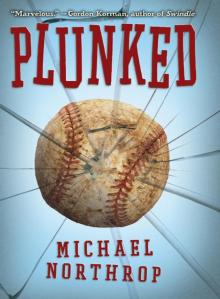 Plunked
Plunked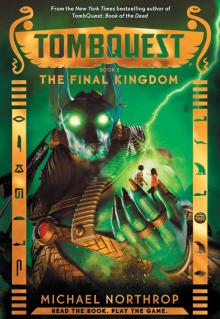 The Final Kingdom
The Final Kingdom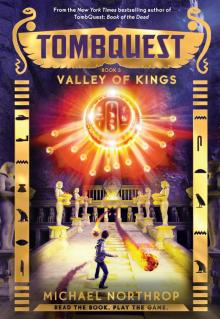 Valley of Kings
Valley of Kings Surrounded by Sharks
Surrounded by Sharks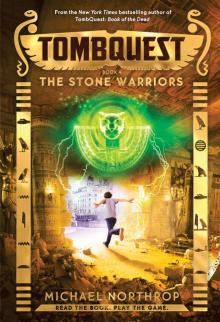 The Stone Warriors
The Stone Warriors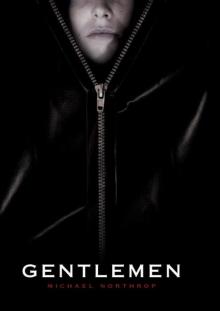 Gentlemen
Gentlemen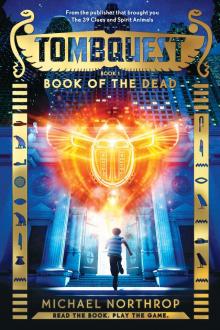 Book of the Dead
Book of the Dead Polaris
Polaris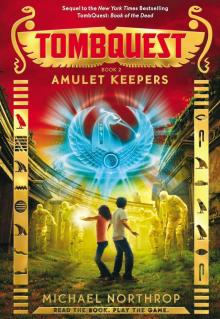 Amulet Keepers
Amulet Keepers